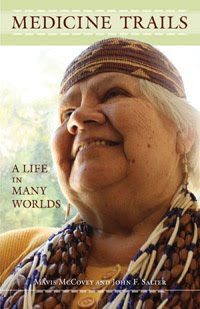MEDICINE TRAILS

Karuk cialis woman Mavis McCovey and cultural anthropologist John F. Salter will make an appearance at Northtown Books in conjunction with their new book Medicine Trails, Monday, November 2nd at 6:30 pm.
Sometime in 1933 here in Humboldt County, a Karuk medicine woman named Daisy Jones had a vision identifying the tribe's next medicine woman. Later that year, Mavis Smither (McCovey) was born, and in the first twelve years of her life she was groomed by a designated group of medicine women to become a spiritual healer.
Medicine Trails is Mavis McCovey's honest and lively account of the many worlds in which she moves: the Indian and white cultural worlds, and the day-to-day and visionary reality of the medicine woman's world, as well as trips to what she calls "the other side": one of the responsibilities of a medicine woman is to bring back a medicine man's soul if he gets lost on the trails of the world beyond-a task McCovey has been called upon to do.
One of very few first-person accounts of Native American healers, Medicine Trails is invaluable for its insights into the experiences of a modern-day medicine woman. And McCovey is a warm and engaging guide not only to her life, but also her family's history and the history of the Karuk, Yurok, and Hupa peoples of the region.
Mavis McCovey has lived along the Klamath River in northwestern California all her life. Trained as a child to be a medicine woman, she assists with the traditional ceremonies of her tribe, the Karuk. The mother of five children, she has also worked as a community health representative and a nurse, and she has been an advocate on issues affecting the health and well-being of the native people of her region.
Dr. John Salter is a cultural anthropologist, teacher, and writer who has worked intermittently with the Karuk Tribe of California and Karuk people since 1968. Trained by Gregory Bateson, Salter received his Ph.D. for a study of the social ecology of the Salmon and Klamath River area. He currently lives in Sacramento, California.
Mavis McCovey makes no exotic claims about her powers, but describes those functions as seamlessly integrated in Karuk culture. More importantly, she describes a living contemporary culture, enriching the melancholy beauty of our shared world
-Freeman House, from the foreword